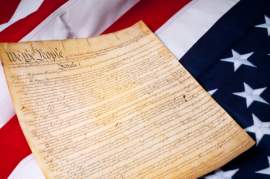
Major Decisions-New York Times v United States

Popular In Constitution
Purpose Of Lifetime Appointment And Pros And Cons Enumerated Powers Bicameral Legislature Background Article 3 Of The Constitution We The People 1st Amendment Who Wrote The Constitution Judicial Review Equal Protection Clause 10th Amendment Three Fifths Compromise 5th Amendment
The U.S. Courts have constantly battled with the interpretation and application of the United States Constitution. An issue that is constantly arising in litigation in the Supreme Court is the First Amendment of the Constitution. The rights guaranteed under the First Amendment, such as the freedom of speech, freedom of press, and freedom of religion, have often been the subject of debate in the U.S. Courts and continue to be so in today's society. U.S. Courts would once again have the responsibility of evaluating First Amendment rights once again in 1971, when the Supreme Court would hear the New York Times v. United States case.
The New York Times v. United States would not be the first time that the U.S.
Supreme Court would hear a case dealing with the freedom of the press granted
under the Constitution's First Amendment. However, this case was significant in
the sense that it would pit a Constitutionally-protected right against the
overall security of the nation. The case would be based on the fact that The New York Times would
obtain a copy of Government documents that would be known as the "Pentagon
Papers."
The Pentagon Papers were a report originating from the Department of Defense that detailed controversial Government tactics in regard to the Vietnam War. The New York Times wanted to publish the documents and make them accessible to the public nationwide. Initially, an injunction was levied against The New York Times that would prohibit it from publishing the Government Pentagon Papers.
The
Government claimed that in making the documents public, the nation's security
would be at risk. However, the famous newspaper would fight the injunction by
citing the First Amendment right to the freedom of the press.
Warren E. Burger was the Chief Justice to hear the
case in the Supreme Court. The Court faced a difficult decision regarding the
applicability of the First Amendment and to what extent the Constitutional
rights granted should be implemented. Even though the Constitution proves to be
the ultimate form of law in the United States, in certain instances its
absolute adherence could prove to be a dilemma, such as in this particular case
with the Pentagon Papers.
Key factors that were considered were whether or not the publishing of the Pentagon Papers proved to be a danger to national security and whether or not the people had the right to be informed. Furthermore, the justification for rendering a decision for either party can prove to have detrimental circumstances in the form of future precedence for Constitutional interpretation of the laws.
However, the Court would eventually grant the decision to The New York Times, holding that the First Amendment rights of the Constitution should be absolute. Nevertheless, the Associate Justices of the Supreme Court had been in disagreement in the final verdict and even had reservations about hearing the case. Regardless, the case regarding the Pentagon Papers would be ruled in favor of protecting First Amendment Rights, which would later become used as precedence for further cases involving the freedoms granted by the Constitution.
NEXT: Major Decisions-Regents of U. of California v. Bakke




















